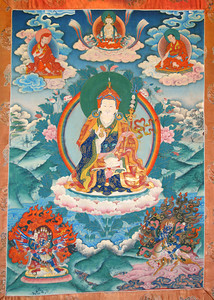An excerpt from a teaching by Jetsunma Ahkon Lhamo called Turning Adversity Into Felicity
Ours is not a religion that believes you can get through a room full of obstacles—which life basically is—without turning on the lights and seeing where the things are that you might trip over. Our religion is one where we turn on the light, we look with our eyes, we do not absent ourselves from the responsibility of clear thought, of the reality of cause and effect relationships, of engaging in those practices that will clear the obstacles.
In our lives, perhaps, we might suffer from the loss of fortune. Let’s say that we have a certain situation where we were very wealthy, we had everything that we needed, and suddenly bam! Misfortune hits. It happens, doesn’t it? It happens a lot. Misfortune hits and suddenly we are no longer wealthy. Perhaps it isn’t about money. Perhaps it’s about relationships. At one point, for the women, the prince rides up on the white horse and everything looks like it’s going to be happily-ever-after, you know, the Dream. For men, the Queen of Sheba has landed in our lap somehow, and here she is with all her blazing glory.
So maybe that kind of thing has happened. But eventually we will find that the cloud definitely has another side to it. It has a silver lining, yes, but it has a little rain in it as well. For many of us, we would experience some loss. Perhaps we might think that we have everything we need, and then simply it is lost. That might occur with our health. Many of us, we don’t plan to die, we don’t plan to get sick, but suddenly, perhaps even at a point where we thought we were young enough and sturdy enough to have been healthy, we find that our health slips and we can no longer rely on our health. And then, for others of us that survive all these other things without too many disasters, eventually we will get old and we will die. So there are these situations that must be dealt with.
Now when we deal with them, should we just paste some sort of unthinking, syrupy, positive statement on top of it and therefore make it acceptable? Should we say, “Ah, well, you know I’ve lost the great love of my life, but hey, it’s not so bad. What’s the big deal? I can do this!” Or, “Once I was rich and now I’m poor, but hey, I’m a positive thinker and wealth will come to me soon, I’m sure.” Do we think like that? I don’t think so.
We are taught by our teachers to engage in creating the causes by which our suffering might end. Clearly if you do not have enough fortune or money in your life, the causes by which that might come to you have not been created, or they haven’t been created in sufficient amounts. So we turn to the guru, not with an empty prayer of, “Gee, hope you’ll land a few thousand in my box. Just stick it in the mailbox. I’ll pick it up tomorrow.” You don’t pray like that. You don’t pray to win the lottery. That isn’t how it goes. In our religion, the difference is that we actually pray for guidance and we use the teachings that the teacher gives us and we begin to create the causes by which we can overcome the obstacles in our lives.
© Jetsunma Ahkön Lhamo
